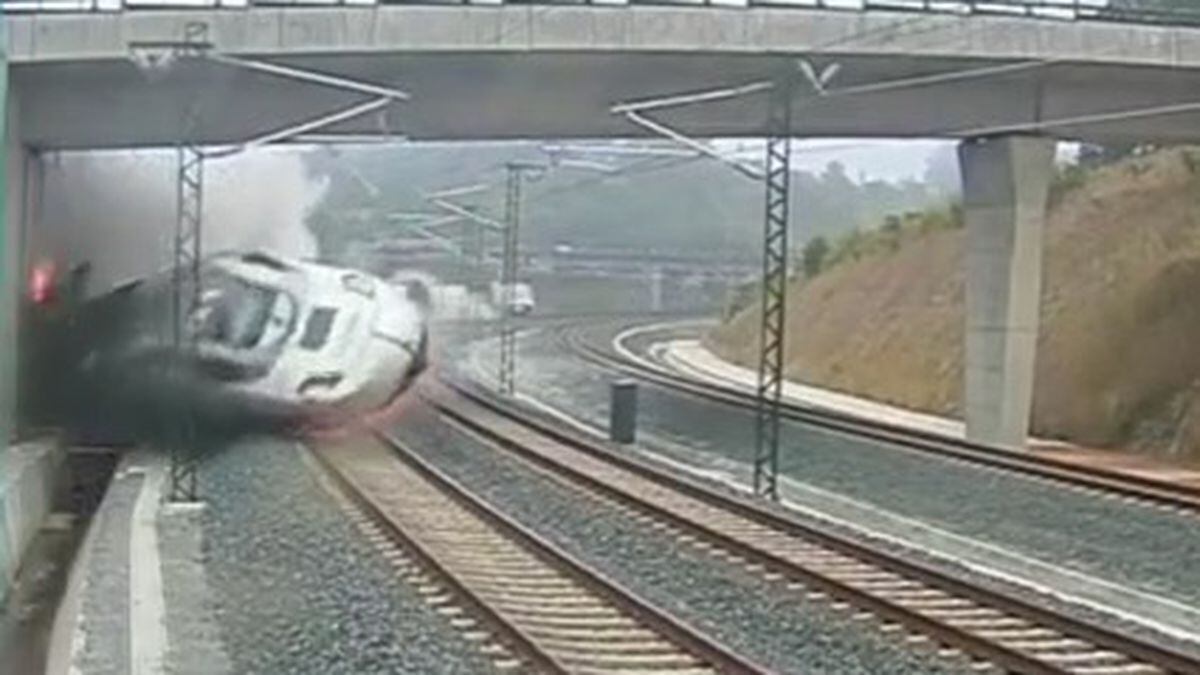Rail crash near Santiago kills 79
The accident is the worst of its kind in Spain in the last 40 years, leaving more than 130 injured The Madrid-Ferrol Alvia train left the tracks after taking an 80km/h bend in the track at 180km/h
As investigators continued their work to ascertain the cause of Wednesday’s horrific Alvia train crash in Galicia, authorities in the region confirmed that the death toll had risen to 79 people.
Workers on the scene spent Thursday collecting debris from the massive accident and removing the damaged rail cars from the tracks. A judge in Santiago de Compostela, where the accident took place, ordered police to take the injured driver into custody and secure the train’s black boxes after announcing a criminal investigation into the incident.
At least 35 of the 130 injured passengers were listed in critical condition at press time. In all, there were 222 passengers traveling on the inter-city train, which was headed to Ferrol from Madrid.
Galician regional government officials said late Thursday that most of the families of the victims had been notified that their loved ones had perished in Wednesday’s night’s derailment.
The US State Department confirmed Thursday that at least one US citizen was among the dead. Earlier, both the US and British Embassies said that Americans and Britons had been injured in the crash. “We are currently gathering information about the accident and are in touch with families of some injured American citizens,” said US Charge d’Affaires Luis G. Moreno in a statement posted on the US embassy website.
Also on the Alvia train was a 22-year-old Mexican woman from Veracruz, according to a daily from the Central American country. A Galician government source said that a full list of the victims would be announced late Thursday, assuming that coroners could finish the job of confirming the identities of the bodies.
The derailing of the Alvia train took place at 8.41pm Wednesday, just four kilometers from the Santiago de Compostela station. The forces involved were such that one of the eight carriages ended up being thrown 15 meters from the track.
Prime Minister Mariano Rajoy, who visited the site on Thursday morning, said that this was “the saddest day of the Apostle” he has ever experienced.
The Day of the Apostle is a regional holiday in Galicia, Cantabria, Navarre and the Basque Country. Rajoy offered his condolences to the families of the victims, and reminded them “you are not alone in your sufferings.”
Galician premier Alberto Núñez Feijóo, who accompanied Rajoy, canceled all celebrations in the region and declared seven days of mourning. Three days of mourning were also declared in the rest of the country.
King Juan Carlos and Queen Sofía traveled to Santiago de Compostela and went directly to the main hospital where the injured were taken.
Besides the 222 passengers, there were also four crew members traveling on the train, which was made up of eight coaches and two engines.
Two of the survivors of the incident told EL PAÍS how they could feel the train taking a bend in the track, under the viaduct carrying Galicia’s main toll road. When they opened their eyes, they said, they were surrounded by bodies.
The train operator, who suffered light injuries, said on his radio after the accident that the train was traveling at 190km/h on the stretch of track, which has a limit of 80km/h. On the previous stretch, however, which has been adapted for Spain’s high-speed AVE trains, locomotives can reach up to 250km/h.
A judge in Santiago de Compostela officially named the conductor of the Alvia intercity train, Francisco José Garzón Amo, as a defendant in his investigation, EFE News Agency reported. The court ordered police officials to take a statement from Garzón, who was admitted to the Santiago Hospital with minor injuries.
Garzón Amo was not found to have alcohol in his system, sources from train company Renfe told EL PAÍS on Thursday.
The exact causes of the accident are still not clear, although a video published on YouTube from a railway security camera suggests that excessive speed may have been to blame.
Meanwhile, condolences poured in from abroad. Among the world leaders conveying messages to the Spanish government were British Prime Minister David Cameron and Russian President Dmitri Medvedev.
In a statement, US President Barack Obama said he was “shocked and saddened” by the tragedy and thanked the Spanish government for aiding Americans who were on board.
This is the first deadly accident to be registered on a high-speed train line in Spain and is the most serious rail incident to take place since 1972.
The track had been adapted for the AVE high-speed trains, but the signaling system had not. An engineer from the Adif state rail infrastructure company, who admitted he was unaware of the exact circumstances of the accident, explained on Wednesday that it would be very difficult for a train to derail simply due to excess speed, and that another factor — involving either the track or the train itself — must have come into play.











































